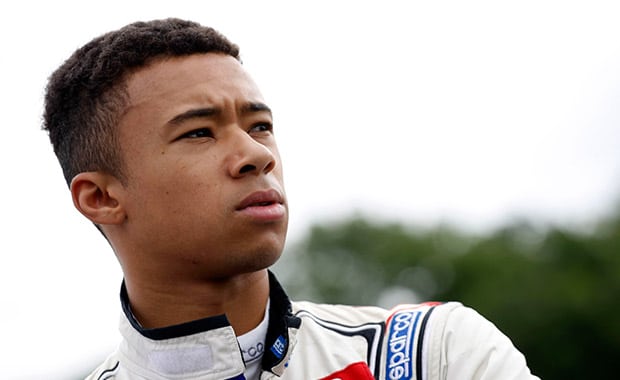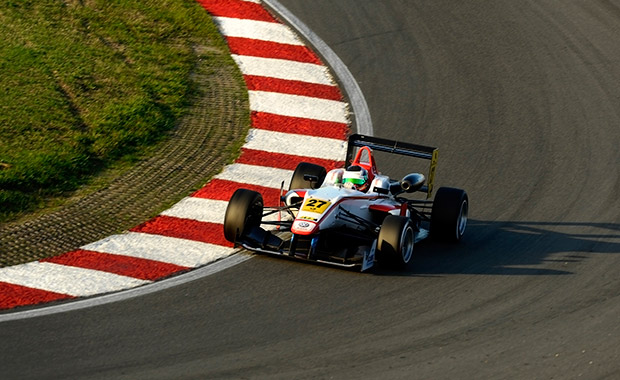
Brilliant Norris deserved better stage than soulless Yas Marina: Up/Down in Abu Dhabi
Lando Norris and McLaren made F1 history in the desert – shame about the track though...

Look down the list of F1 hopefuls confirmed on the GP3 grid for 2014 and most of them have been doing the same thing for the last few years: F3, Formula Renault, Indy Lights and so on.
Not Jann Mardenborough, Arden’s new signing. He was playing video games.

Mardenborough in the Red Bull simulator
This promising young Brit was not totally without experience. Karting from the age of eight he had to stop three years later when the local track closed and his family couldn’t afford to race further afield. Then when he was 19 he participated in GT Academy, a joint venture between Nissan and Sony. Pitting 90,000 racers against each other on Gran Turismo, the plan was to find drivers they could mould into a professional racers. Mardenborough won in 2011 and now he’s on the road to an F1 drive with Red Bull backing.
Following a promising 2012 in GTs – including a class podium in the Dubai 24 Hour and a win at the Nürburgring round of the British GT Championship – Mardenborough spent 2013 racing all over the world in single-seaters and finished on the LMP2 podium at Le Mans. Campaigns in British and European F3 as well as the New Zealand-based Toyota Racing Series gave Mardenborough a crash course in how to drive an open-wheeled car.
This season he’s already taken three wins on the way to second place in the TRS, underlining his potential with some assured drives. But he insists it was never in the plan.

Mardenborough at Zandvoort in European F3, 2013
“I thought I was too old for single-seaters,” he says. “It was really Nissan’s idea, sending me down the Formula 3 route to steepen my learning curve. You really get to know how to drive properly in those cars. I spent all last season learning the limits of a single-seater and it was difficult, they’re on edge all the time. It’s hard to find that sweet spot. I could feel the improvement as the year wore on though, and I ended up testing a GP3 car in Abu Dhabi. I was pretty quick straight away and I just thought, ‘wow, this is good!’
“Now it’s time to get the ball rolling. I’ve had a good start with the second place in the Toyota Racing Series – in GP3 I’ll keep improving and hopefully I’ll be challenging for podiums. That’s the aim for this year.”
Think about where Mardenborough came from and it raises an interesting question: how many undiscovered talents are there out there? Maybe your friend who’s pretty quick round country lanes in his Fiesta would have made a decent racer given the chance.
That’s why GT Academy is such a positive force in modern motor sport. We can talk all day about how drivers can’t get anywhere these days without money, but what about the kids who can’t even afford to get started? It’s fair to say the programme has its detractors – count yours truly among them to begin with – and you certainly can’t learn everything about track driving from a video game.
But you can still learn a lot. Throttle application, steering input, situational awareness and consistency are all skills that need to be learned to succeed at simulated racing. It’s only the physical sensation and the personal responsibility that are missing and as technology improves, the former is increasingly easy to replicate. Nissan is helping to take care of the latter.
Alongside teaching the GT Academy winners how to drive the programme also prepares them how to be a professional racer, from how to train to dealing with the media. That support doesn’t stop when they start moving up the ladder.
“Nissan is still very much involved in my management and public relations,” says Mardenborough. “It’s all planned out and that gives me less to worry about.”
Johnny Herbert, one of the competition’s judges and advisors, has been very impressed with the youngster’s development. “I was mentoring Jann a couple of years back. He’s proved, in a massively short space of time, that he can make it in some of the toughest championships around at the moment. He’s adapting really well, dealing with guys that have been racing almost their entire lives – and in cars for several years – and succeeding.”
What especially impresses Herbert about Mardenborough and the other young hopefuls is how they manage to shift from bedroom to cockpit. “It fascinates me. Everything they do in the game is visual, it’s almost how they feel the car. When I’m in the car I feel it through my hips, my fingertips, my toes, I feel the g-force. That’s how I manage the grip. When I play the game I find it quite difficult – you only know to back off when you hear the squeal of the tyres. It takes me a long time to get up to speed.

Herbert with Paul O’Neill at the GT Academy Race Camp in 2013
“They know the circuits upside-down, they know the lines and they do a lot of studying before they get on track. But it’s about adapting to the feeling rather than just what they see in the virtual world. A racing car is like a live animal that needs to be tamed and you need to be the one in control, not letting the car taking you for a ride.”
More than any of the other graduates of the GT Academy programme Mardenborough is exhibiting the raw talent and application required to succeed. With a manufacturer like Nissan supporting him as he rises through the ranks – rare at such an early stage in a driver’s career – he’s being given all the tools needed to make the most of what he’s got. No matter how he arrived at this point, that’s something to applaud, but the true test begins now.
More from Alex Harmer
1: the latest and best Formula 1 film
Mike Conway on the Indy 500
Colin Turkington’s BTCC return

Lando Norris and McLaren made F1 history in the desert – shame about the track though...

Could it be 'Meet the new boss, same as the old boss' for Max Verstappen at Aston Martin?

The 2025 Sao Paulo GP demonstrated F1 at its brilliant best – showing just how important racing at the right venue is

Could F1 2025 be about to wake from its slumber? James Elson identifies the culprit poking the bear